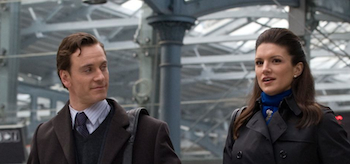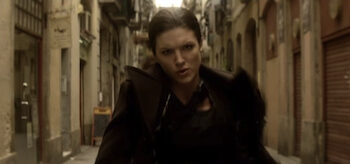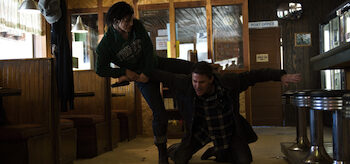Film Review: HAYWIRE (2011): Steven Soderbergh, Gina Carano
Haywire (2011) Film Review, a movie directed by Steven Soderbergh and starring Gina Carano, Ewan McGregor, Channing Tatum, Michael Fassbender, Bill Paxton, Michael Douglas, Antonio Banderas, Michael Angarano, Matthieu Kassovitz, Natascha Berg, Aaron Cohen, Maximino Arciniega, Tim Connolly, Anthony Brandon Wong, and Eddie J. Fernandez.
Haywire is an action film on a diet. The dietary aspect of the film, much like late 80’s and early 90’s action films, is one of expected and delivered simplicity. This is not necessarily a bad thing as some found the complexity of Brian De Palma’s Mission: Impossible detrimental. Unlike plot-heavy Salt and style-infused Hanna, Haywire can be summed up as: Guy grows jealous of girl, guy tries to kill girl, girl goes after guy.
There is a brutal, complicated swiftness to the first fight scene of Haywire that is never duplicated again in the film, not even in a later hotel room battle. What is never answered about that scene though (the first fight scene) is how a scolding hot cup of coffee could be thrown in someone’s face and the recipient of the java bean splash could show no sign of its application at the end of the scene. Couple that with the fact that the two involved recently had sex (implied, and liked each other) and the viewer is left with plot points that are very strange, especially coming from director Steven Soderbergh, who was so deliciously detail oriented in Contagion.
Haywire’s plot works in the first two acts of the film but not in the third. Everything in the film slows down in the third act and loses its gathered momentum, including its physical confrontations between characters e.g. the fight in near darkness within the bathroom. In a film that is built around its fight scenes, this was a cardinal sin that should not have been allowed to happen.
The technical aspects of the fight scenes were great but the chase scene in Barcelona, Spain on foot made no sense. Mallory chases a “loose end” in broad daylight in front of sixty eyewitnesses standing on sidewalks, sitting in cafes, ATM cameras, and digital cell phone cameras, kills the person she was pursing (wearing no gloves when she does so. Finger prints anyone?) and then there are no law enforcement or even YouTube repercussions afterward. This may be a clever homage to late 80’s, early 90’s action films where ramifications were illogical or non-existent but that seems unlikely.
One of the best aspects of this film is that the protagonist Mallory Kane (Gina Carano) is not infallible or invincible. When Mallory falls in the second act of the film and hurts herself, it was one of the realest and most intriguing moments in the film, even more than when James Bond did so at the beginning of The World is Not Enough. It made Mallory human and imperfect, someone who could be injured and killed. That sequence and her limping afterward beat most of the action scenes in the film’s tepid third act. All that was missing from the fall scene was Mallory lifting the side of her shirt in a mirror to inspect the damage and bruising the fall had caused.
To Steven Soderbergh’s credit and unlike the majority of other action directors, he did not forget the musical aspect of his film and does his best through David Holmes to infuse to film with an archaic spy-film mystique (circa 1960’s and 1970’s).
The story framework of Haywire was its biggest flaw: Mallory reciting what brought her to the diner to one of the interlopers in the film’s first fight scene. Every time the story cut back to the two of them in a car, the viewer’s interest in the story tapered low. The past and its ramifications were far more important and interesting yet they are suspended for a non-suspenseful story arc. Even the classic motif of fire symbolizing Mallory’s anger (lightly reflected on her face after a character’s death in the third act, illustrating internal rage) was more intriguing than this particular non-linear plot structure.
Steven Soderbergh’s Haywire almost succeeds at what it set out to be: a good action film and a good spy film. By the middle of the third act, the action and story end up going nowhere stimulating.
Rating: 7/10
Related Articles
FilmBook's Newsletter
Subscribe to FilmBook’s Daily Newsletter for the latest news!













